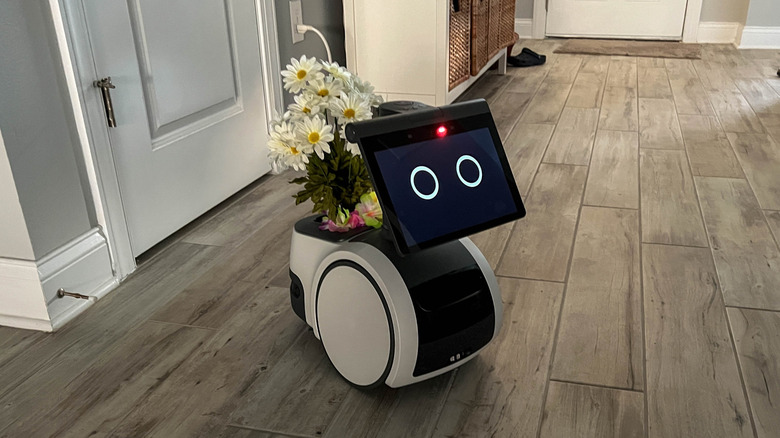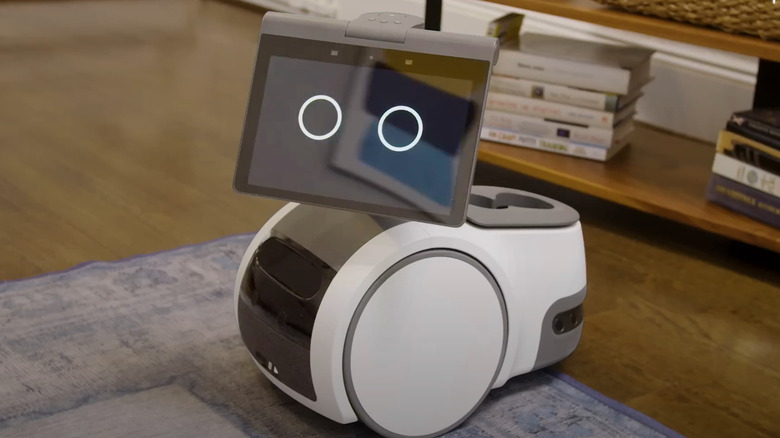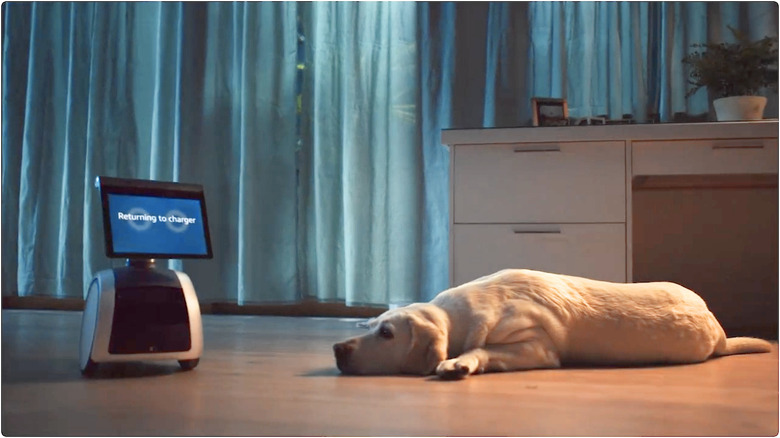Why The Amazon Astro Could Be More Than Just A Novelty Home Robot
We may receive a commission on purchases made from links.
When the Amazon Astro first debuted in 2021, the internet buzzed with excitement and skepticism about whether the robot would rocket them forward into the Jetson-esque future of robot butlers. In the four years since the announcement, the consensus has veered towards the latter. The Amazon Astro largely functions as a voice-enabled smart hub on wheels, rather than a sentient, fully functioning assistant ready to revolutionize the home. Weighing 20 pounds, with two cameras and a 10.1-inch HD 1280x800 resolution touch screen beset with facial expressions, the Amazon Astro was, according to the critics, a poor impression of Pixar's Wall-E without its functionality.
Recently, however, some users have begun to point out an under-discussed function that may transform the Amazon Astro from a novelty robot capable of burping and joining conga lines to an indispensable part of users' homes: its ability to function as a mobile assistant for disabled and elderly customers. With facial recognition software, interconnectivity with Amazon applications like Amazon Pharmacy, and a cubbyhole in its rear, the Amazon Astro is capable of bringing disabled family members items, reminding them to take their medicine, showing their Ring camera feed, and even sending a service animal a well-deserved treat. And while all these functions might seem like cute life hacks to some, people with limited mobility might find the Astro to be an indispensable tool that makes their lives happier, easier, and safer.
Disappointment or necessity?
From its launch, Amazon has seemed confused about the direction of its product. Take Astro's run as an enterprise technology, an 11-month stint in which Amazon sold Astro as a rolling patrolman. According to an internal memo obtained by The Verge, Amazon discontinued the robot in September 2024, offering a full refund (and a $300 credit) to buyers of its $2,349.99 robot and scrapping the program to "accelerate our progress and ongoing research to make Astro the best in-home robot."
For its at-home applications, Astro is effectively a mobile version of Amazon's Echo with hints of a personality. Many reviewers found this disappointing, stating that the Astro couldn't automate enough core household tasks to be considered revolutionary. Add major privacy concerns, and many experts questioned the appliance's viability.
But as Steve Aquino wrote for Forbes, Amazon Astro's utility comes down to perspective. While Astro might seem trivial to abled customers, many disabled customers find simple tasks like retrieving objects, taking medication, and answering their doorbell burdensome — even dangerous. For these customers, the Astro's automation capabilities could be life-altering. This also applies to the elderly, as Lila MacLellan pointed out in her 2022 review for Quartz. These simple functions could enable the elderly to age more gracefully at home, easing the burden on families and caregivers. For instance, a caregiver can place pharmaceuticals in the Astro's cargo bin, instructing the robot to deliver them when a patient needs to take them. In another example, Astro's compatibility with the OMRON wrist blood pressure monitor allows users to get accurate blood pressure readings in real time.
The future of at-home care
Of course, this functionality isn't unique to the Amazon Astro. Considering the recent growth of home-robot solutions, Amazon is sure to see stiff competition as it seeks to become the premier provider of at-home robots. Market analysts expect the home robot market to reach $24.5 billion by 2028, a 230% increase since 2023. In particular, the caregiving sector of the market could prove particularly competitive.
In China, for instance, the country initiated a national program to introduce robots into elderly care facilities. Meanwhile, in Japan, the AI-powered humanoid robot AIREC is being designed to assist its rapidly aging population. Germany's Karlsruhe Institute of Technology, meanwhile, is aiming to ease the burdens of aging with its humanoid JuBot robot. In the United States, several research teams are developing robotic-powered caregiving solutions. MIT, for instance, is developing the Elderly Bodily Assistance Robot to help users move around the house without falling, while researchers at St. Joseph's Haub Innovation Center are piloting an AI-powered robot named Pepper programmed to socialize with older people with autism. The QTrobot — a project funded by Toyota — has been praised for making education more inclusive, while basic pet-like models, such as Tombot's golden retriever robot Jennie, have garnered widespread acclaim for their work with dementia patients.
Whether Amazon can stay ahead of the competition and become the world's premier home caregiving robot will likely depend on whether Astro can expand its functionalities. Amazon's brand equity, resources, and ability to scale production should give it a head start. Unfortunately for Amazon, another tech giant, Meta, is also considering investing heavily in an AI-powered humanoid home robot, according to Bloomberg. As of July 2025, the Astro is only available by invitation. However, interested customers can request an invitation and will receive an answer "in the coming months."


